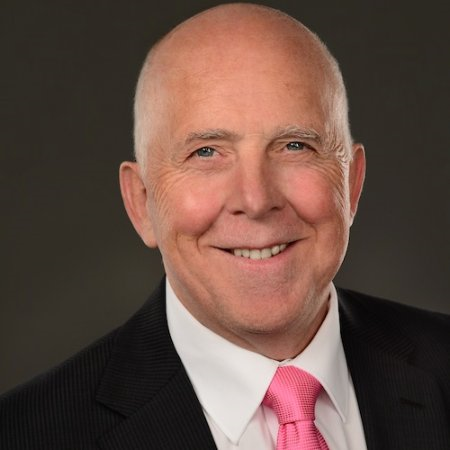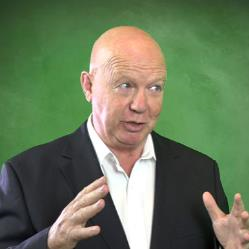"How do we get to an executive with a message that makes them interested enough to want to give us an audience" - Interview by John Smibert
In sales, when we target a market, what are the things we should strategically think about, and plan for, to ensure we have a high chance of opening the door to senior executives and gaining their interest?
 To help answer this question Steve Hall suggested that I act as his guinea pig and use one of my clients as a case study.
To help answer this question Steve Hall suggested that I act as his guinea pig and use one of my clients as a case study.
Steve asked me some challenging questions about this case study that had me searching for answers.
In doing so, you will find, he clearly illustrated the thought process we should go through in preparing our targeted approach. The sorts of questions to which we need to get answers, and the reasons why, became very clear through this case study.
If you are trying to improve your capability to target new clients, open doors to executives, and gain their interest - then this discussion is likely to be valuable for you.
I commend this 9 minute video to you - alternatively you can read the transcript below.
**********
Steve Hall is a thought leader in sales. He's an executive sales coach, a keynote speaker, a storyteller and he likes to play Devil's Advocate to help dispel myths around selling and marketing. He helps his clients to sell more effectively to "C" level executives and to develop compelling messages and business stories.
Subscribe to future videos See previous 'TALKING SALES' videos here
Interview:
John: Welcome back Strategic Selling Group and beyond in B2B sales! I've got Steve Hall with me again - welcome back, Steve!
Steve: Welcome back, John!
John: Last time Steve said, "Let's talk through a case study for prospecting," so I'm calling on that, and he's just told me he's going to ask me to give some of the details of the case study, so I'm looking forward to this. [laughter] Steve, let's talk case study.
Steve: Okay. Tell me about someone you've worked with recently.
John: What came to mind was I was working with an organisation selling cyber security services and solutions, and they were entering the Australian market, they had a few salespeople here and they weren't really getting take up in the market, and they asked me to come and help them.
Steve: Was it just cyber security, or were they covering other areas too?
John: It's interesting, they had quite innovative products and services, software products, particularly cloud-based, analytical, really intelligent solutions that would be able to look at all the people interacting with their customer organisation and analyse that.
 So it really wasn't just cyber security or looking at the bad guys, it was also looking at how the good guys interacted with the organisation. They were able to protect against the issues of cyber security and all the risks associated with that, but also look at how you could improve the customer experience and the staff experience and so on.
So it really wasn't just cyber security or looking at the bad guys, it was also looking at how the good guys interacted with the organisation. They were able to protect against the issues of cyber security and all the risks associated with that, but also look at how you could improve the customer experience and the staff experience and so on.
Steve: Okay, that sounds interesting. Let's look at that through the things we talked about, first of all the marketplace. Obviously the marketplace for cyber security is big; most companies now are a bit paranoid about cyber security.
John: Every company needs to think about it.
Steve: Every company needs to think about it, and that's great in terms of having a big market, but it's bad when you're thinking about focusing on a particular segment. I mean, you could focus on the Democratic Party in America to start with [laughter], you could focus on a whole heap of different people, but let's say, "Who are the people that really are paranoid about security?" and one obvious one is banks and financial institutions.
John: Yes. In fact, they felt that banking and finance organisations were a target for them.
Steve: Okay, so let's say our market is going to be banks and financial institutions. Who are they? Well, here in Australia it's pretty obvious there's four big banks, there's a heap of regional banks, there's some credit unions, there's a fairly defined market, so your market is defined in terms of the specific organisations you're going to talk to. The next question is which specific individual in each bank you want to talk to.
 John: That was really interesting, because when I first started talking with this organisation and looked at their strategy, they were targeting the IT organisation, and IT had cyber security people, they had data security people and so on, and they identified those people. When I started asking, "What is the value you can bring to an organisation?" they started widening it out to improving customer experience, etc. Suddenly when I started asking a few questions, the people in the financial institutions they were wanting to target covered a whole range of people.
John: That was really interesting, because when I first started talking with this organisation and looked at their strategy, they were targeting the IT organisation, and IT had cyber security people, they had data security people and so on, and they identified those people. When I started asking, "What is the value you can bring to an organisation?" they started widening it out to improving customer experience, etc. Suddenly when I started asking a few questions, the people in the financial institutions they were wanting to target covered a whole range of people.
Steve: Yes. Look, IT people are important and you do need to talk to them, but IT people, with respect to the ones watching, tend to be focused on technical areas and often have the ability to say no but don't have the ability to say yes, so while you need to talk to IT they're probably not your primary target. And from what you said, it seems to me that everyone from... I mean, the CEO is obviously highly concerned about risk, a major part of his role is risk.
John: When we researched the Australian financial institutions, the board of directors have cyber security as a general item on every board meeting, it really is top of mind, and the reason is that the insurance policy, the cost of insuring against cyber security has gone through the roof, the directors themselves are liable should there be a major cyber security breach and the bank loses customer data and so on and so forth, so it is really critical to the board of directors as well as a whole host of other people. As a result, a lot of the organisations have put in a new position they call Chief Information Security Officer, CISO, and they put those roles in reporting directly to the board or to the CEO.
Steve: It's a big issue, and, as we've seen in Australia and in the USA, it can be very embarrassing for a bank when they lose customer data.
John: I guess we don't want to make this discussion about cyber security, but the important thing is in this case we identified a whole lot of different people, and here's a key person that they weren't even targeting when I first started the discussion with them, the Chief Information Security Officer.
Steve: In our first interview we said that it was really basic to who you were talking to; it may be basic, but it's not necessarily that simple.
John: That's right.
Steve: You need to look at the full picture, and the question is now then if you're going to approach a particular institution, let's narrow it down to one particular institution, who do you want to talk to in that institution, and I think the answer is lots of people. You want to talk to the CEO, you want to talk to the CISO, you want to talk to the CIO, and you want to talk to the Head of Customer Experience and Head of Marketing and a whole heap of people. So then we look at the question what do they care about, and the answer is it depends.
John: Every one of those people when we looked at it... In one case, one large investment bank with some retail banking had enormous differences when we talked to different people in the bank as to what they really cared about.
Steve: Exactly.
John: They all understood cyber security, but what it meant for them was totally different from the CEO to the CISO guy I talked about, to IT and to customer experience and customer service.
 Steve: Absolutely. You need to think about what your message is - which we've talked about, crafting messages - for those different people, so let's look at one of those people which is the CEO and let's look at what we're trying to achieve, because we talked about that as well. If we're going to contact the CEO, what do we want to achieve? One of two things probably. Either a meeting, that's ideal; often we can't get a meeting with him or her, then a referral to a senior person that we can get a meeting with, because that's what we're trying to achieve.
Steve: Absolutely. You need to think about what your message is - which we've talked about, crafting messages - for those different people, so let's look at one of those people which is the CEO and let's look at what we're trying to achieve, because we talked about that as well. If we're going to contact the CEO, what do we want to achieve? One of two things probably. Either a meeting, that's ideal; often we can't get a meeting with him or her, then a referral to a senior person that we can get a meeting with, because that's what we're trying to achieve.
So, what's the message we craft? Well, we need to think about what they care about, we need to tell them as much as they need to know to want to talk to us and to meet with us, without talking about... If we start talking about cyber security, they're going to flick us off to someone else; if we talk about analytics or big data and the cloud, we're in the bowels of IT. So, what does the CEO really care about? You talked about that, they care about risk.
John: Risk and customer experience, retaining and growing their customer base.
Steve: Yes, but the thing that you need to focus on is one message above what they care about most. Because if you say, "We can do this and this and this," you confuse them and they don't know what to do. You need to say what they care about most. The message could be for instance "We want to talk to you for half an hour about reducing personal risk for your directors." I'm not saying that's the message, but that's the sort of message that would cut through.
John: In this particular bank that was absolutely key, and the directors were all paranoid about it.
Steve: Absolutely. So, the key to this entire process is who is your target market, who are the specific companies in that market, who are the particular individuals, what do they each care about based upon them and their position, and then for each individual how do you get to them with a message that will cut through, not make them jump to the incorrect conclusion and flick you off to someone else and that will focus on the thing that's most important to them? How do you find that out? You do it through what you did, through research. You look at annual reports, you look at LinkedIn and you look at things that people have published. The great thing about targeting the people at the top is that they're normally more visible, they write a Chairman's or a CEO's Message in the annual report, they are quoted in the press, so it's quite easy to find out what they really care about.
John: Exactly.
Steve: The question is then how do you get through to them with a message that makes them interested enough to want to give you an audience.
John: Alright. Can we finish there, and maybe come back and talk more about how we do craft that message, what sort of tools we use to actually open the door and how we go about that?
Steve: We certainly can.
John: Let's do that.
Steve: Okay - take care!
John: Thanks, Steve!
****************
More interviews with Steve Hall:
****************************

Your Invitation: I invite you to join the Sales Leader Forum group on LinkedIn where you can experience informative discussions with your peers and sales thought leaders on subjects like the one we have discussed here. I also invite you to subscribe to the
- Sales Leader Resource Centre here
- Sales Leader YouTube channel here (300+ sales leadership videos)
Please Share: If you valued this article, please share via your Twitter, LinkedIn, Google+ and Facebook social media platforms. I encourage you to join the conversation or ask questions. So feel free to add a comment on this post - I promise to respond. If inclined please follow my LinkedIn post page here.
Want to touch base? If you have questions please feel free to contact me - email: john.smibert(at)salesleaderforums.com, Phone: +61 404857893 or Skype: john.smibert